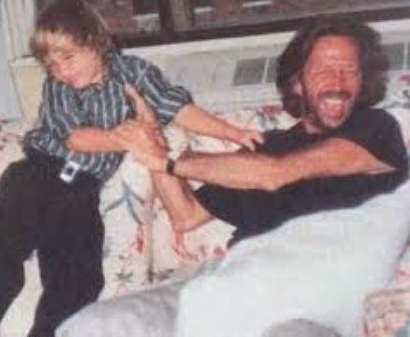By then, Eric Clapton had already lived through more than most people could ever imagine. He had battled heroin addiction, faced the brink of self-destruction with alcohol, and outlived legends like Jimi Hendrix, Duane Allman, and Stevie Ray Vaughan—each taken by their own personal demons and brilliance. Yet Clapton had managed to survive. In 1987, he achieved sobriety. Just the year before, he had been given a gift worth living for: his son, Conor.
Conor, born in 1986 to Italian actress Lori Del Santo, was the reason Clapton turned his life around. Though he and Del Santo were no longer together, their shared love for their son created an unbreakable bond between them. For Clapton, who had spent years trapped in addiction and regret, the arrival of Conor was a lifeline—a reason to stay sober, a chance at redemption.
On that fateful March morning, Clapton was looking forward to spending the day with his four-year-old son. They had planned a trip to the Bronx Zoo, a simple outing filled with the joy of a father and son bonding over animals and sunshine. Conor was staying at his mother’s apartment on the 53rd floor of a high-rise on East 57th Street in Manhattan. While they waited for Clapton to arrive, the building’s maintenance crew had begun cleaning the windows, one of which had been opened to wash the exterior glass.
Unaware that the window was open, Conor, full of excitement and energy, ran through the apartment, calling for his mother and eagerly awaiting his dad. He thought the glass was still in place. He ran toward it. And in a split second, he fell.
Fifty-three stories.
When Clapton arrived, the scene that greeted him was the stuff of nightmares: sirens, police, paramedics, and neighbors, all frozen in horror. His son was gone.
Grief is a strange and powerful thing. The loss of a child is a pain that defies comprehension. It’s not just the death of a loved one—it’s the death of every future moment you were supposed to share. The birthdays, the hugs, the “I love you, Dad”—all erased in an instant, leaving a gaping hole in a parent’s heart. For Clapton, music had always been a refuge, a place where pain could be transformed into something beautiful. But after Conor’s death, even that escape felt impossible. His guitars remained untouched. The silence in his home mirrored the silence in his heart.
But grief, as painful as it is, has a language of its own. Slowly, Clapton began to reach for his guitar again—not because the pain had gone away, but because music was the only thing strong enough to carry it. Out of this darkness came the song “Tears in Heaven,” written in collaboration with lyricist Will Jennings. The song became an anthem of mourning, not just for Clapton but for anyone who had experienced unimaginable loss.
“Would you know my name if I saw you in heaven?
Would it be the same if I saw you in heaven?”
Each line of the song was raw, an open wound turned into melody. It wasn’t just a song about death; it was a father’s heartbroken plea: will my child still recognize me when we meet again?
When “Tears in Heaven” was released in 1992 as part of Clapton’s Unplugged album, it struck a deep chord with listeners. The song won three Grammy Awards, but its true impact couldn’t be measured in accolades. It became a voice for anyone who had lost someone they couldn’t imagine living without. The song gave words to the grief that had been carried in silence, allowing people to feel less alone in their pain.
Clapton performed “Tears in Heaven” at nearly every show for years, each time reliving the pain of that day. Eventually, he stopped playing it. “I didn’t feel the loss anymore,” he explained. “That loss was such a part of performing the song. It was time to let it rest.”
Conor’s death had irrevocably changed Clapton. His sobriety, once a personal struggle, became an unbreakable resolve. Staying sober wasn’t about his health or his fame—it was about honoring Conor, about being the man his son could have looked up to.
In 1998, Clapton founded the Crossroads Centre in Antigua, a treatment center for people battling addiction. Through benefit concerts, he funded the center for years, helping thousands regain control of their lives. The center became his way of turning his overwhelming grief into something meaningful—a promise to Conor that his son’s death wouldn’t be in vain.
Today, at 79, Clapton has been sober for nearly four decades. He doesn’t often speak about Conor, but when he does, there’s a quiet acknowledgment in his words that some grief never fades. Parents who’ve lost children understand this: the pain doesn’t disappear—it simply changes form. It becomes a part of you, a scar you learn to live with.
For Clapton, that grief continues to fuel him. It lives in his music, in the foundation he built, in the life he leads with humility and purpose. Through his own suffering, he has given others permission to grieve, to feel, and to heal. “Tears in Heaven” isn’t just about Conor—it’s about every loss too heavy for words.
Conor’s brief life may have lasted only four years, but his legacy ripples far beyond his short time here. He changed his father and, through him, changed the world of music. The tragedy that took him also gave birth to one of the most enduring songs ever written—a song that will continue to remind people that love, even when cut short, never truly dies.
